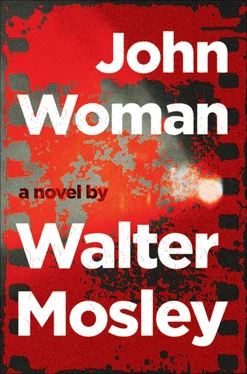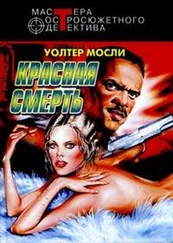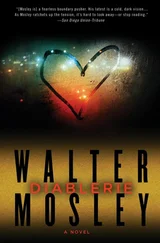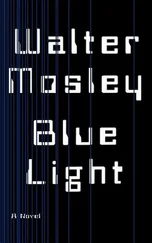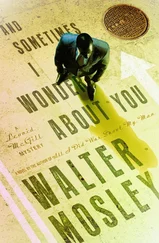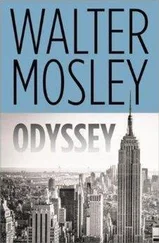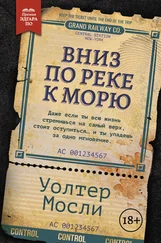He opened the viewing panel and unfolded a chair for her to sit in. He perched on a stool behind her as she watched The Sheik, starring Rudolph Valentino.
The cop leaned forward, lost in long-ago passion. Cornelius’s fervor was right there in front of him; there in the room where his mother seduced his father, where he’d squandered his seed turning the pages of Dirty Nymphs, where he murdered Chapman Lorraine, where the dead man lay entombed not six feet from them.
After half an hour he put his hands on Colette’s shoulders and squeezed as his mother had him do when she had a headache. He contemplated that move from the moment she sat down. When Colette leaned back he took in a breath so deep that it got stuck. His fingers dug deeper because he couldn’t exhale. Colette hugged the fingers of his right hand by pressing against them with her jawbone. He let out a loud sigh then. This embarrassed him but he kept on kneading the strong flesh.
When the movie was over Cornelius walked Colette out of the projection room. She held out her hand and said, “Thanks.”
After the handclasp she said, “Well... I better be going.”
Four steps down and Cornelius said, “Can we have coffee sometime?” She took three more steps, stopped and turned. Her face was very serious.
“Come down here,” she said.
Something about the command thrilled CC.
He stopped at her stair. She went a step higher, enabling herself to look him in the eye.
“What do you mean?” she asked.
“Ju-just that I’d, I would like to see you again. Maybe talk about the films.” There appeared a hint of a smile on Colette’s pursed lips. Cornelius noticed that she had small scar on her right cheek. There was another along the right side of her lower lip.
“Just coffee?”
“Yeah.”
A smirk came into Colette’s scarred lips, then a smile. “You want my number?”
“If that’s okay.”
“You know I work very hard,” she said. “It took me months just to find time to come here.”
“Anytime would be fine,” Cornelius said.
“What about school? And what would your parents say about you seeing some woman for coffee who was almost twice your age?”
Almost, Cornelius thought.
“My mother is gone,” he said. “My dad is bedridden. I work here to pay our bills. I can do what I want.”
Colette took a white card from her red handbag. Cornelius caught a glimpse of the pistol nestled therein. She scribbled a number on the back.
“The printed side is my work number and the backside is my home,” she said. “Call me and we’ll see.”
The next day he called the home number. When a man’s voice answered he hung up. He redialed and the man, now angry, answered again. Cornelius hung up.
For a week the boy fretted.
The man is probably her boyfriend, he thought. She didn’t wear a wedding ring. Maybe it’s her brother or her roommate. Lots of mom’s relatives sometimes stay with each other.
He called, the man answered. Cornelius hung up.
The next day he got an answering machine.
“We’re not in but you can leave a message,” Colette said. “Either Harry or Colette will get back to you later.”
Cornelius hung up without a word.
We’re not in. The agitated teenager wrote these words down. He thought about her tone of voice and the permanence of the phrase. He called four more times to make sure he heard the message right.
That night he developed a fever. Violet Breen moved in for a few days to care for both father and son.
At night Cornelius could hear the buxom Irishwoman reading Yeats to Herman. He’d drift from the poems into nightmares about the decomposing corpse behind the wall.
France Bickman agreed to do double duty and show the films while the boy recuperated. Cornelius worried that France might remember the secret door and wrench it open with a crowbar. He imagined Chapman’s flesh turning to liquid and leaking out from under the door, then Colette coming in her pink blouse to arrest him. He’d start awake with a gasp hearing “A Dialogue of Self and Soul” rendered in Violet’s gentle brogue.
On Thursday morning the fever broke and Cornelius went to school. He sat quietly in classes, almost as if he wasn’t there. He had no friends among the students and avoided teachers, counselors and coaches with their helping inquiries. He did homework and took exams but Cornelius wasn’t interested in school. He knew there was no future; Herman’s history lessons had taught him that much.
“We all fade into the tapestry of the past,” Herman often said, “becoming like so many tiny knots in the weave of fine Chinese silk. There is nothing to distinguish you, me or even who we might think is a great man. Time passes and we all diminish until the fabric of our age renders unto dust.”
School was just another connective knot of thread, a passing moment.
That evening he went to work. It was the week of the annual Charlie Chaplin festival so the theater was crowded. Cornelius opened the viewing panel and watched, while imagining his fingers kneading Colette’s strong shoulders.
At the beginning of the second reel he ran down to the corner pay phone and entered the number printed on her card.
“Missing persons,” she answered.
“Colette?”
“Who is this?”
“It’s me, um, Herman.”
“Oh. Hi. I was wondering if you were ever going to call me.”
“Yeah,” Cornelius said. There was a siren wailing down the street.
“Where are you?”
“On the street. I got a twenty-minute reel playing.”
“Did you call my house?”
“No.”
“Really? Because somebody’s been calling. My boyfriend thinks I have something going on.”
Boyfriend.
“I got sick,” the boy said. “I had a fever or something.”
“Oh. Are you okay?”
“Yeah. Well I guess I better be going.”
“Why’d you call if you’re just gonna get right off?” There was humor in her tone.
“I just wanted to say hi I guess.”
“What about that coffee?”
“Um, wouldn’t your boyfriend be mad?”
“You’re just a kid, Herman. Why would he be mad?”
“No reason I guess. There’s a place I go to on Second. It’s called Uno. ”
“I know it.”
“What about four tomorrow?”
Colette was waiting for him, sitting across from the booth where Cornelius and his mother usually sat. She had on a rose-colored summer dress with quarter-inch straps and a zigzag stitch pattern across the bodice.
Her light brown skin reminded him of the coffee frosting on his father’s favorite doughnuts.
“Hi,” she said, smiling. “I didn’t order for you because I didn’t know what you drink.”
“Mocha cappuccino,” the boy said.
The waiter, Gino, came to the booth.
“Hey, CC,” he greeted. “Long time no see. How’s your mother?”
“She moved to Alaska,” the boy said, feeling like he was under a light as bright as the sun.
“Hello,” Gino greeted Colette.
“Hi,” she replied holding out a hand to the mustachioed elder gentleman. “I’m Colette.”
When Gino went away to order Cornelius’s sweet coffee Colette asked, “Why’d he call you CC?”
“My name isn’t Herman,” the boy confessed. “That’s my father’s name. He’s been sick so I’ve been doing his job. It started before I was sixteen and I kept his name so we wouldn’t lose the paycheck.”
“You work every day?”
“Please don’t tell anybody. If I lose that job we’d be broke.”
“What about Lorraine?” she asked and Cornelius’s fingers went stiff.
“Huh?”
“Won’t he get into trouble if he has an underage boy working there?”
Читать дальше
